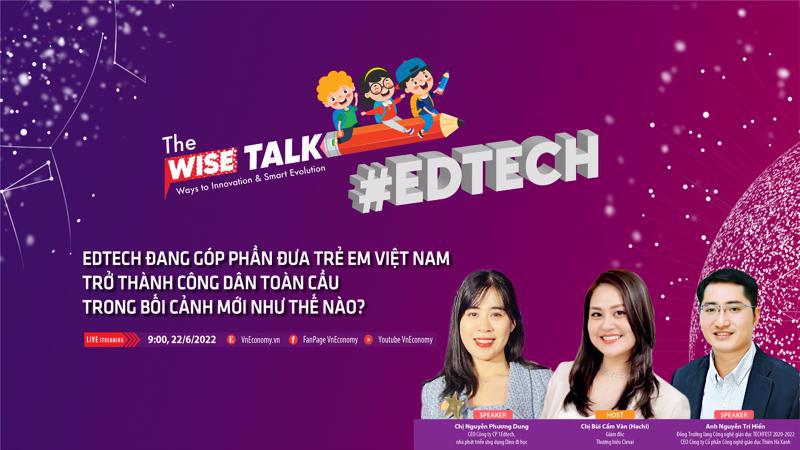The Covid-19 pandemic boosted demand for the education of global citizens, which signals development opportunities in education technology (edtech), The WISE Talk, organized by Vietnam Economic Times on June 22 with the topic: “How is education technology (edtech) contributing to making Vietnamese children become global citizens in the new context?”, heard.
In attendance were Mr. Nguyen Chi Hien, Co-head of TECHFEST 2020-2022 and CEO of edtech provider the Thien Ha Xanh JSC, and Ms. Nguyen Phuong Dung, CEO of the 1Edtech JSC, the developer of “Dino di hoc”.
In 2021, global edtech platforms attracted total investment of more than $30 billion. At least 16 unicorns (with a valuation of more than $1 billion) have appeared in the sector. In Vietnam, 2021 was considered a record year, with more than $160 million invested in its edtech market. According to market researchers Ken Research, the country’s edtech market could reach $3 billion in value by 2023, with a compound annual growth rate of some 20.2 per cent in the 2019-2023 period.
Covid-19 opened up development opportunities for e-learning tools, as when social distancing measures were applied, families and schools had to go digital to ensure children’s education, Ms. Dung told the gathering. The rise of digital transformation has sparked demand for educational products, as parents seek a broader education for their children. She also spoke of the personalization of education, which comes from the development of technological tools such as artificial intelligence (AI) and virtual reality (VR). “Technology development is expected to enhance the experience of students,” she said.
Regarding educating global citizens, it is crucial that concepts of “global citizen” and “global citizen education” be thoroughly understood and their importance acknowledged. According to Ms. Dung, a global citizen is a person who can see similarities in different people and that educating them creates environments where cognitive, behavioral, and socio-emotional elements are enhanced. “The need for educating global citizens was not changed by Covid-19,” she said. “The only thing that changed is the method, as tools were diversified to offer alternative education methods.”
Technology can support each individual to become a global citizen. The more advanced the technology, Mr. Hien said, the more educational methods can be created. “People can now study from the best teachers in the world, and can gain access to lectures wherever they want to and whenever they want to,” he explained.
He also spoke of the importance of language skills, soft skills, and, especially, digital skills in the process of being a global citizen. Global issues are now the responsibility of everyone, and digital tools are gateways for people to connect to each other to resolve mutual problems.
“The development of edtech applications is a new issue and in the long term will provide alternative methods to the development of education in general,” he believes.









 Google translate
Google translate